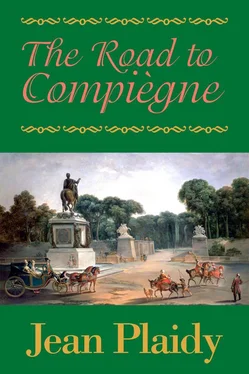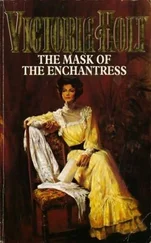The King hesitated. To bestow such a high honour on the Marquise would cause a rumble of discontent through the Court. He was unpopular in Paris; he did not wish that unpopularity to extend to his immediate circle.
A tabouret for the Marquise! He must brood for some time on such a matter for, dear as she was, he must remind himself of her origins.
* * *
There must be an official celebration of the Dauphin’s recovery, which would necessitate another journey into Paris.
There would be the ceremonial drive from the Château into the city, and the thanksgiving service at Notre Dame. The King’s ministers, knowing the trend of opinion in Paris and the fast continued growth of the King’s unpopularity, hastily reduced the price of bread, hoping that by so doing they could ensure a loyal greeting from the Parisians.
Louis set out without any enthusiasm for the journey. Heartily he wished that he was taking the road to Compiègne instead of the one through Paris.
The Queen in her carriage came behind him. She had no such fears, for she knew that the people regarded her as a poor ill-used woman, and that the more they hated the King, the greater was their sympathy for her.
A few people at the roadside shouted ‘ Vive le Roi! ’ as the King drove by, but that happened outside the city; as soon as they entered the streets of the capital there was nothing but sullen silence.
The service over, the drive back began, and again that sullen silence was encountered. The King’s carriage passed, and as the Queen’s came near to the Pont-du-Jour a man with haggard face and ragged coat broke through the guards and leaped on to it.
He threw a piece of black bread into the Queen’s lap and shouted: ‘Look, Madame! This is the sort of bread we are asked to pay three sous the pound for!’
The Queen stared at the bread on her lap while the man was dragged from the coach.
The horses were whipped up, a sullen murmur broke from the crowd. The King and the Queen heard the words: ‘Three sous the pound for bread we cannot eat! Bread . . . bread . . . give us bread . . .’
It seemed that there could not be a royal visit to the city these days without some such demonstration.
* * *
When the Infanta, Louis’ eldest daughter, arrived at Versailles on a visit, he was delighted.
She would comfort him, he said, for the loss of his dear Anne-Henriette. Adelaide, observing the affection between them, was jealous, for since the death of her sister she had felt herself to be firm in the role of the King’s favourite daughter.
It was difficult however to compete with the fascinating and worldly Infanta. Louis revived a pet name of her babyhood and referred to her as his Babette. Babette was wiser than Adelaide and immediately consolidated a friendship with the Marquise, which pleased the King.
She now had a son and daughter and was therefore to be allowed to spend a year at Versailles. ‘My home,’ she said, ‘for which I have never ceased to long.’
In the first weeks of her return the King was so delighted with her that he forgot his depression; but once she had charmed him, Babette could not help showing that there were ulterior motives in this great show of pleasure in being with her father.
‘I am your daughter,’ she told Louis, ‘your eldest daughter. And I am condemned to spend my days in that dismal hole of Parma!’
Louis promised that, if he could do anything at any time to raise her state, he would do so.
She was dissatisfied. Her ambitions were limitless. Now she had children for whom to plan, she wanted a throne for her son and nothing less than the Imperial crown for her daughter.
Young Joseph, son of Maria Theresa, was the husband she needed for her child. Imperiously she suggested that, if need be, France should go to war to bring about this marriage.
Louis might listen to his daughter’s plans with an indulgent smile, but he began to grow a little restless in her company.
He was heading for one of those moods of melancholy from which it seemed only the Marquise could save him.
But many were speculating as to the change in the relationship between the King and the Marquise who, they noted, was now significantly installed in the rooms which had once belonged to Madame de Montespan; could that mean that nothing but friendship existed between her and the King?
It was said that young girls – often of the lower classes – were brought to his apartments in secret.
Could such a state of affairs go on?
Quite clearly it was time some enterprising and ambitious person brought to the notice of the King a woman who could take the all-important role of maîtresse-en-titre which Madame de Pompadour seemed so gracefully to have abandoned.
* * *
The Comte d’Argenson believed that he could bring about the dismissal of the Marquise, and he discussed the matter with his mistress, the Comtesse d’Estrades. The Comte, who was a younger brother of the Marquis d’Argenson, the diarist, was at this time Minister of War and in high favour with the King; he feared the Marquise, and moreover, should a new mistress reign in her place, like most of those about the King he realised what great advantage could come his way if she were a protégée of his.
It was his scheming mistress who called his attention to the very pretty, frivolous and newly married Comtesse de Choiseul-Beaupré.
The Comtesse d’Estrades called on the young lady to discover whether she would be amenable, and the two ladies began by discussing the Marquise.
‘It seems,’ said Madame d’Estrades, ‘that the woman grows older as one watches her.’
‘Indeed!’ cried Madame de Choiseul-Beaupré. ‘She must be quite ancient. What the King finds to admire in her it is beyond my wits to discover.’
‘The King,’ her companion added, ‘is a man of habit. So long has he been making his way to the woman’s apartments that it has become a ritual. Someone should break him of an unnecessary habit.’
‘Is it true,’ asked the young woman, ‘that he no longer sleeps with her?’
‘That is said to be the case.’
‘If His Majesty fell in love with someone else she would doubtless be dismissed.’
‘There is a great opportunity for some clever woman.’
The Comtesse d’Estrades eyed her companion speculatively. The shaft had struck home. Madame de Choiseul-Beaupré was twittering with excitement.
The King’s mistress! Someone like Madame de Montespan. What glory had come to her ! It was true though that she had been displaced eventually by Madame de Maintenon, who had even married Louis Quatorze.
But Louis Quinze had a wife; still perhaps the Queen would die. Madame Anne-Henriette had died, and the Dauphin had recently come very near to death.
The young Comtesse felt almost giddy, contemplating the power which had come to the Nesle sisters. Only Madame de Mailly had suffered; the other two had died, but the King had doted on them even as he had doted on Madame de Pompadour.
‘How . . . would it be possible?’ she asked.
‘If a young lady were pretty enough, charming enough, amusing enough and eager enough . . . there would be many to help her. Perhaps Son Excellence himself. I can vouch for Monsieur d’Argenson. They discuss the charms of women with the King. They would whet his curiosity and then . . . a little supper party. After that it would rest with the lady herself. The King is affectionate, courteous, helpful . . . and you must admit, extremely handsome.’
‘I do admit that,’ said the young Comtesse clasping her hands together and looking into a future which seemed to her glorious.
* * *
Louis was interested in the accounts he heard of the pretty young Comtesse.
Читать дальше








